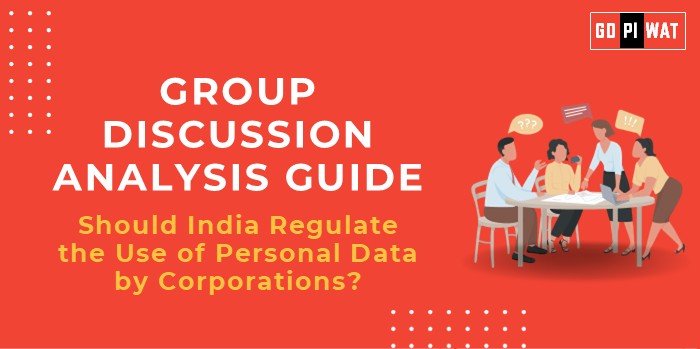📊 Group Discussion (GD) Analysis Guide
🛡️ Should India Regulate the Use of Personal Data by Corporations?
🌐 Introduction to the Topic
Opening Context: “In the digital age, data is considered the ‘new oil,’ but unregulated data practices raise concerns about privacy, security, and corporate accountability.”
Topic Background: With India becoming a global leader in digital transformation (e.g., 900 million internet users), questions about personal data protection are central. Recent legislation, such as the Digital Personal Data Protection Bill 2023, marks a critical step in balancing innovation and privacy.
📈 Quick Facts and Key Statistics
- 🌍 Internet Users: 900 million+ (2024) – Highlights the scale of digital engagement.
- 💳 Digital Payment Transactions: 11.5 billion/month – Indicates reliance on digital systems.
- ⚠️ Data Breach Incidents: Increased by 20% year-on-year (2023) – Shows escalating cyber risks.
- 🌎 Global Data Regulation Examples: GDPR (EU), CCPA (USA) – Provides comparative benchmarks.
👥 Stakeholders and Their Roles
- Government: Drafts regulations to protect citizens’ data.
- Corporations: Must comply with privacy standards, balancing innovation and data security.
- Citizens: Provide consent for data usage; advocate for rights.
- International Bodies: Set global standards for data practices (e.g., GDPR influence).
🏆 Achievements and Challenges
✅ Achievements
- 📜 Policy Milestones: Introduction of the Digital Personal Data Protection Bill 2023.
- 📈 Industry Growth: Data-driven innovation in fintech and e-commerce.
- 🌐 Global Compliance: Steps towards alignment with GDPR-like frameworks.
⚠️ Challenges
- 🔍 Lack of Infrastructure: Insufficient monitoring mechanisms for corporate compliance.
- 💼 Regulatory Burden: Potential to hinder startups.
- 📖 Lack of Awareness: Citizens are often unaware of their data rights.
🌍 Global Comparisons
- ✅ Success: EU’s GDPR protects millions through robust data security.
- ❌ Challenges: The US struggles with a fragmented approach.
📚 Structured Arguments for Discussion
- ✅ Supporting Stance: “Regulation fosters trust and attracts investments by ensuring data security.”
- ❌ Opposing Stance: “Excessive regulation may stifle innovation, particularly for startups.”
- ⚖️ Balanced Perspective: “A middle-ground approach ensures both innovation and consumer trust.”
📖 Effective Discussion Approaches
- 📊 Opening Approaches:
- Cite impactful statistics, e.g., “India faces a 20% annual rise in data breaches.”
- Highlight a case study, e.g., “AIIMS cyberattack showed the risks of weak data protection.”
- ⚡ Counter-Argument Handling:
- Rebut over-regulation concerns by showcasing GDPR’s global successes.
- Discuss examples where lack of regulation caused major data breaches.
📊 Strategic Analysis of Strengths and Weaknesses
- 💪 Strengths: Growing digital ecosystem, policy momentum.
- ❌ Weaknesses: Limited enforcement mechanisms, lack of public awareness.
- 🌟 Opportunities: Global leadership in data regulation, innovation in cybersecurity.
- ⚠️ Threats: Rising cyberattacks, potential conflicts with global tech giants.
🎓 Connecting with B-School Applications
- 📌 Real-World Applications:
- Data security in supply chain management.
- AI ethics projects balancing innovation and privacy.
- 📖 Sample Interview Questions:
- “What role does data privacy play in corporate responsibility?”
- “How can India achieve a balance between regulation and innovation?”
- 💡 Insights for Students:
- Understand regulatory frameworks like GDPR.
- Explore tech-driven privacy solutions.


